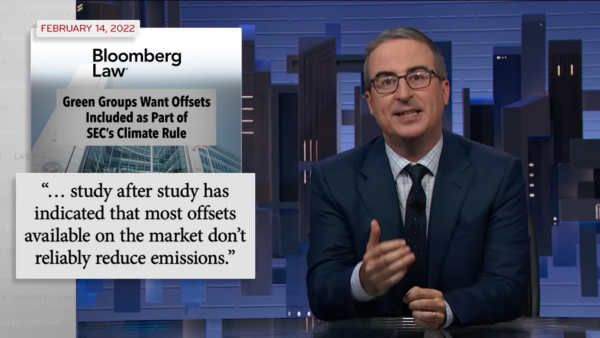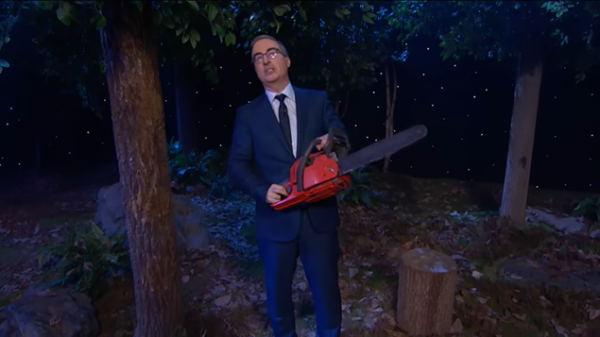Carbon Offsets With John Oliver
Millions of people around the world are working to combat the climate crisis. Corporations have been getting in on the action in multiple ways, one of the most popular being carbon offsets. Yet the popular environmental option isn’t as effective as most might think. John Oliver pointed out exactly why in his show, Last Week Tonight.
What exactly is a carbon offset? It’s meant to be a reduction or removal of carbon dioxide in the atmosphere. Companies (and sometimes individuals) can pay for it in order to negate the effects of their greenhouse gas emissions. (For example: planting enough trees to absorb the amount of carbon dioxide you’ve created through your manufacturing processes.) Basically, if you spend enough money on these carbon credits, you can be considered carbon neutral. This has become a part of many corporations’ climate plans because of how easy and cheap they are to obtain. Unfortunately, a worrying amount of the companies that provide the offsets don’t actually help reduce your carbon footprint.
After covering these basics, John Oliver explains just what’s wrong with the system. Studies have shown that the majority of the offsets that are purchased aren’t really helping to reliably affect carbon emissions. Yet, these credits have become the backbone of the environmental policies of many huge polluting companies. The problem is, the reliance on carbon offsets is making things worse. Without enough checks and balances, it’s hard to ascertain who’s actually making a difference, and who’s taking advantage.
One of the biggest issues has to do with the concept of additionality. If a tree was already going to be planted, it shouldn’t count as an offset, as the means and will to do so was already there. If empty land may have been taken up by a factory, but now the carbon offsets are allowing the land to be bought and filled with native flora instead, that’s considered the true goal. Sadly, it turns out a lot of the companies that sell offsets to corporations take advantage of the former situation, making money without actually improving the world. This still allows corporations to make claims about how much carbon dioxide they have reduced in the world – without affecting the carbon in the atmosphere at all.
The dangerous outcome of carbon offsets is that corporations that need to reduce their emissions have gotten too comfortable thinking it’s taken care of. This takes off important pressure they should be under to make their processes better for the environment. Aren’t there carbon offset registries that are supposed to be neutral third parties who verify the legitimacy of these offsets? Yes, but they themselves are not accountable to anyone. This just adds to the culture of not putting enough pressure on either of the parties in the offset transactions.
The idea of protecting forests from being cut down is, of course, a great one. The problem is that so many of these offset options don’t truly cancel out the carbon emissions that are being churned out every day. It is possible and is what many countries are now working toward, by doing things like replacing fossil fuels with wind and solar power. But when a company buys offsets to get under an emissions limit, and the offset doesn’t do anything other than allow a company to pollute more, it leads to a worsening of the climate crisis.
It’s hard to take action in a situation where there are such huge entities involved. Ideally, public and legal pressure will end up changing the way carbon offsets are handled. In the meantime, individuals can help by switching their home’s power source to solar. Many utilities are also now under pressure to transition over to renewable energy, but just like the big companies with carbon offsets, they will do the minimum to get by until they’re forced to be better. If you switch to solar on your own, you are actively reducing emissions by stopping the use of fossil-fuel-powered energy. You will also be in a great position to convince others to follow in your footsteps. Rather than investing in something that is impermanent or not as effective as it brags, you can take action to reduce your carbon footprint.
FREE CONSULTATION
Claim your basic human right to clean, affordable solar now. Schedule a free, no-pressure consultation with one of our experts.



